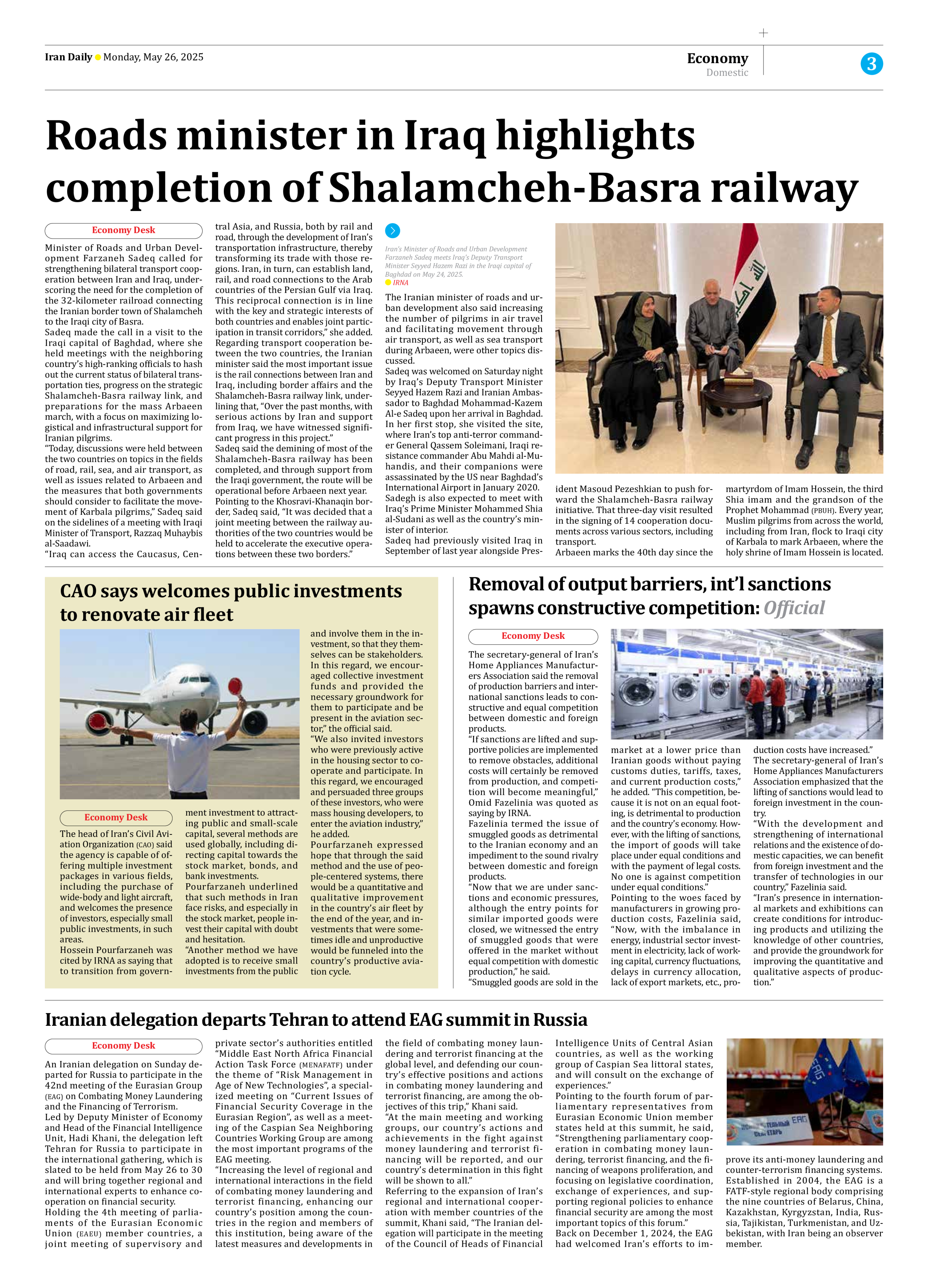
Roads minister in Iraq highlights completion of Shalamcheh-Basra railway
Minister of Roads and Urban Development Farzaneh Sadeq called for strengthening bilateral transport cooperation between Iran and Iraq, underscoring the need for the completion of the 32-kilometer railroad connecting the Iranian border town of Shalamcheh to the Iraqi city of Basra.
Sadeq made the call in a visit to the Iraqi capital of Baghdad, where she held meetings with the neighboring country’s high-ranking officials to hash out the current status of bilateral transportation ties, progress on the strategic Shalamcheh-Basra railway link, and preparations for the mass Arbaeen march, with a focus on maximizing logistical and infrastructural support for Iranian pilgrims.
“Today, discussions were held between the two countries on topics in the fields of road, rail, sea, and air transport, as well as issues related to Arbaeen and the measures that both governments should consider to facilitate the movement of Karbala pilgrims,” Sadeq said on the sidelines of a meeting with Iraqi Minister of Transport, Razzaq Muhaybis al-Saadawi.
“Iraq can access the Caucasus, Central Asia, and Russia, both by rail and road, through the development of Iran’s transportation infrastructure, thereby transforming its trade with those regions. Iran, in turn, can establish land, rail, and road connections to the Arab countries of the Persian Gulf via Iraq. This reciprocal connection is in line with the key and strategic interests of both countries and enables joint participation in transit corridors,” she added.
Regarding transport cooperation between the two countries, the Iranian minister said the most important issue is the rail connections between Iran and Iraq, including border affairs and the Shalamcheh-Basra railway link, underlining that, “Over the past months, with serious actions by Iran and support from Iraq, we have witnessed significant progress in this project.”
Sadeq said the demining of most of the Shalamcheh-Basra railway has been completed, and through support from the Iraqi government, the route will be operational before Arbaeen next year.
Pointing to the Khosravi-Khanaqin border, Sadeq said, “It was decided that a joint meeting between the railway authorities of the two countries would be held to accelerate the executive operations between these two borders.”
The Iranian minister of roads and urban development also said increasing the number of pilgrims in air travel and facilitating movement through air transport, as well as sea transport during Arbaeen, were other topics discussed.
Sadeq was welcomed on Saturday night by Iraq’s Deputy Transport Minister Seyyed Hazem Razi and Iranian Ambassador to Baghdad Mohammad-Kazem Al-e Sadeq upon her arrival in Baghdad.
In her first stop, she visited the site, where Iran’s top anti-terror commander General Qassem Soleimani, Iraqi resistance commander Abu Mahdi al-Muhandis, and their companions were assassinated by the US near Baghdad’s International Airport in January 2020.
Sadegh is also expected to meet with Iraq’s Prime Minister Mohammed Shia al-Sudani as well as the country’s minister of interior.
Sadeq had previously visited Iraq in September of last year alongside President Masoud Pezeshkian to push forward the Shalamcheh-Basra railway initiative. That three-day visit resulted in the signing of 14 cooperation documents across various sectors, including transport.
Arbaeen marks the 40th day since the martyrdom of Imam Hossein, the third Shia imam and the grandson of the Prophet Mohammad (PBUH). Every year, Muslim pilgrims from across the world, including from Iran, flock to Iraqi city of Karbala to mark Arbaeen, where the holy shrine of Imam Hossein is located.







